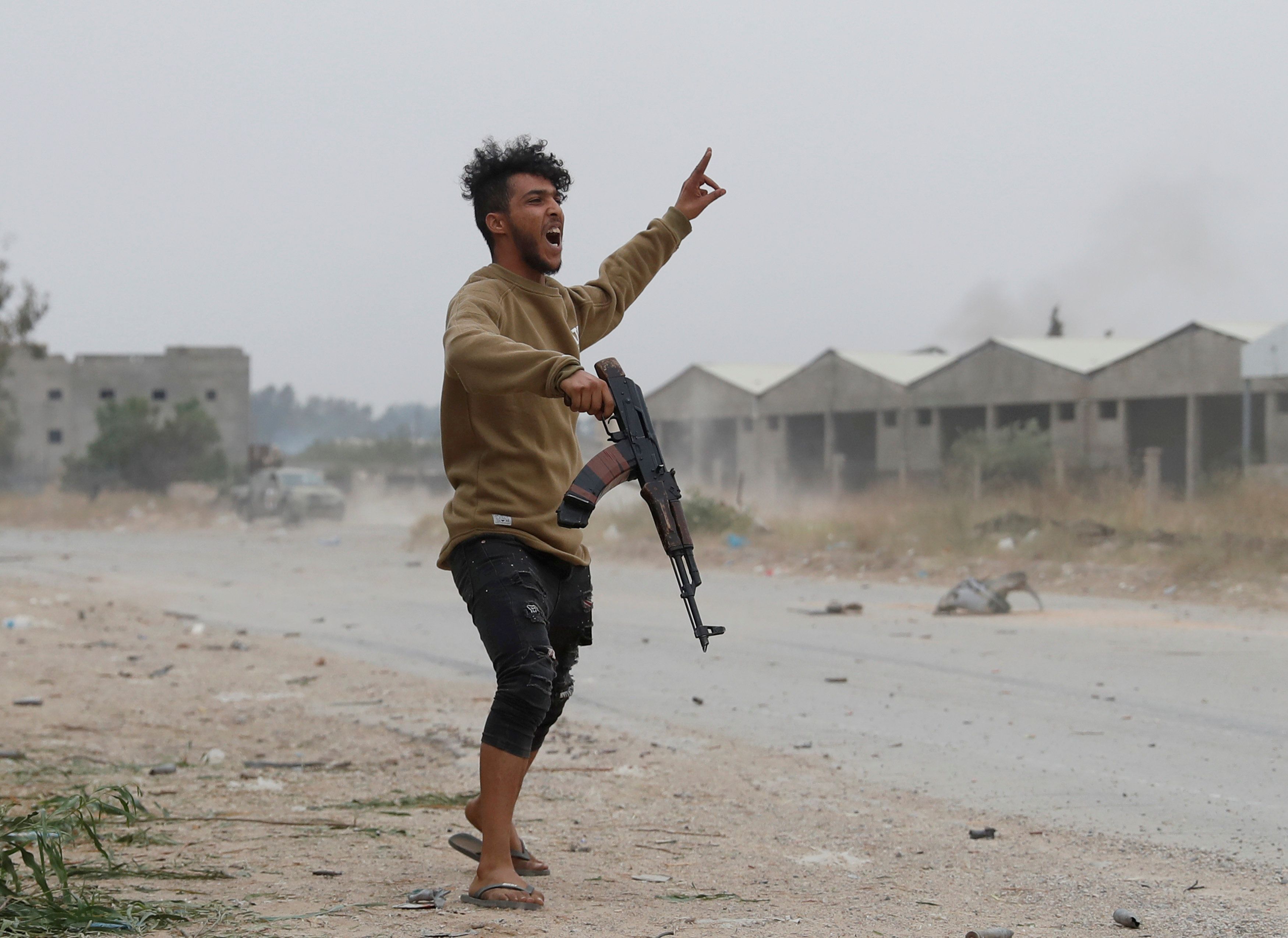January 17, 2020
It's been nine years since Libya's long-time despot Muammar Qaddafi was killed in a violent uprising, bringing the oil-rich country to the brink of civil war. That conflict entered a new stage last year when violence between warring factions competing for territory intensified around Tripoli, Libya's capital, leading to the displacement of some 300,000 civilians. In recent weeks, fighting has intensified again, and ceasefire talks have failed. Here's a look at who's who and how we got here.
The background – Since Qaddafi's downfall, a dizzying numberof jihadist groups, militias and tribes have vied for power. The self-declared Islamic State is just one of the armed groups that gained a foothold in that country, using it as a springboard to mobilize forces and wage attacks across North Africa and the Middle East.
Since 2014, political power has been split between two rival governments, the UN-backed Government of National Accord (GNA) that rules Tripoli, and a rival faction led by the self-described anti-Islamist general Khalifa Haftar, who leads the Libyan National Army (LNA). Each side has captured oil fields – the country's economic lifeline – and each has its own central bank. For years, European leaders have tried to mediate an end to the conflict, to no avail.
The Libyan conflict has also become a proxy fight between external powers. Haftar's LNA has major backing from Egypt, the United Arab Emirates, and Saudi Arabia, as well as Russia, which has deployed mercenaries to support him. Meanwhile, the main external supporter of the Tripoli-based government is Turkey, which wants to curb the influence of its Saudi, Egyptian, and Emirati regional rivals, but has to be careful about enraging Russia. Turkish President Recep Tayyip Erdogan recently began deploying troops there, including 2,000 Syrian proxy fighters.
While the Libyan conflict is years in the making, recent events have gained the world's attention.
An uptick in violence: Haftar's offensive against Tripoli, launched last April, has escalated in recent weeks, accompanied by an air campaign. An airstrike by rebel forces loyal to Haftar on a military academy in the capital last week killed 30 people, mostly students.
General Haftar's territorial gains: Earlier this month, Haftar's forces captured the strategic coastal city of Sirte. To date, the LNA's territorial gains have mainly been across the sparsely populated Sahara Desert region, but Sirte is a crucial port on the Mediterranean Sea.
Outside attention to the conflict in Libya has generally focused on two key issues:
Oil, oil, oil: Libya has the largest oil reserves in Africa, and among the ten largest in the world. Instability in the country threatens to disrupt output, potentially causing global prices to rise. Since Libya's popular uprising, warring groups have used oil facilities as leverage to press their financial and political interests.
A dangerous gateway to Europe: Libya's proximity – across the Mediterranean – to major European states has made it a gateway for African migrants hoping to reach safe haven in the EU. Qadaffi once sealed his country's maritime border in exchange for generous compensation from the Europeans. But the chaos in Libya has been a boon for the people smuggling trade, leading to a surge in African migrants embarking on the dangerous voyage to Italy and Greece in rickety boats. The EU's stopgap policy of funding migrant detention camps on Libyan shores has led to human rights abuses.
Prospects for peace? Earlier this week, ceasefire negotiations in Moscow broke down when Haftar abruptly left the Russian and Turkish sponsored talks there. On Sunday, Germany will host fresh talks aimed at getting all outside players to stop meddling and to enforce an arms embargo. Prospects for an enforceable breakthrough, however, are slim.
More For You
World Central Kitchen staff hand out free soup in a neighbourhood that experiences electricity and heating outages following recent Russian attacks on Ukraine’s civilian infrastructure during subzero temperatures in Kyiv, Ukraine February 3, 2026.
REUTERS/Thomas Peter
1,170: The number of high-rise buildings in Kyiv that were left without heating following a barrage of Russian attacks last night on Ukraine’s capital and its energy facilities, per Kyiv Mayor Vitali Klitschko.
Most Popular
What We’re Watching: US critical minerals summit, Rafah crossing reopens, Border violence in Pakistan
Feb 02, 2026
U.S. President Donald Trump and Japanese Prime Minister Sanae Takaichi hold up signed documents regarding securing the supply of critical minerals and rare earths, at a bilateral meeting at Akasaka Palace in Tokyo, Japan, October 28, 2025.
REUTERS/Evelyn Hockstein
Representatives from the European Union, United Kingdom, Japan, and others will meet in Washington this week to discuss a strategic alliance on critical minerals.
Hard numbers: Large protests in Czechia, UAE-linked firm has large stake in the president’s company, & More
Feb 02, 2026
People take part in a rally in support of Czech President Petr Pavel, organised by Million Moments for Democracy group in reaction to dispute between President Pavel and Czech Foreign Minister and Motorists chair Petr Macinka, in Prague, Czech Republic, February 1, 2026.
REUTERS/Eva Korinkova
80,000: The number of people estimated to be in the streets of Czechia on Sunday to show their support for President Petr Pavel after he blocked the nomination of an environmental minister who performed the Nazi salute and posted Nazi memorabilia.
US President Donald Trump and musician Nicki Minaj hold hands onstage at the US Treasury Department's Trump Accounts Summit, in Washington, D.C., USA, on January 28, 2026.
REUTERS/Kevin Lamarque
The US has started handing $1,000 to the bank accounts of newborn babies. But can policies like this one help boost sagging birthrates in advanced democracies?
© 2025 GZERO Media. All Rights Reserved | A Eurasia Group media company.
